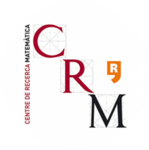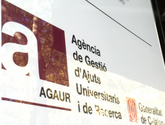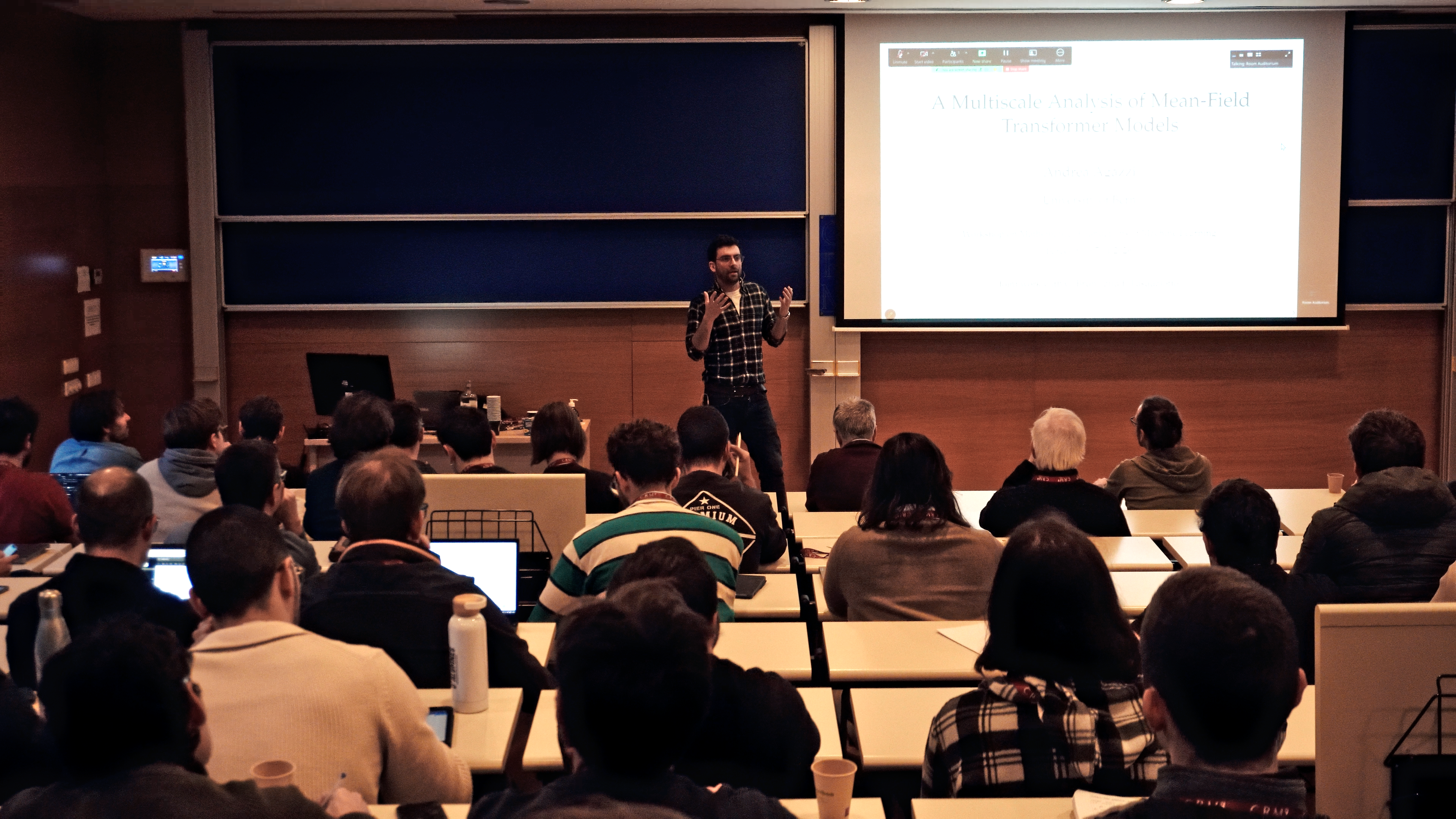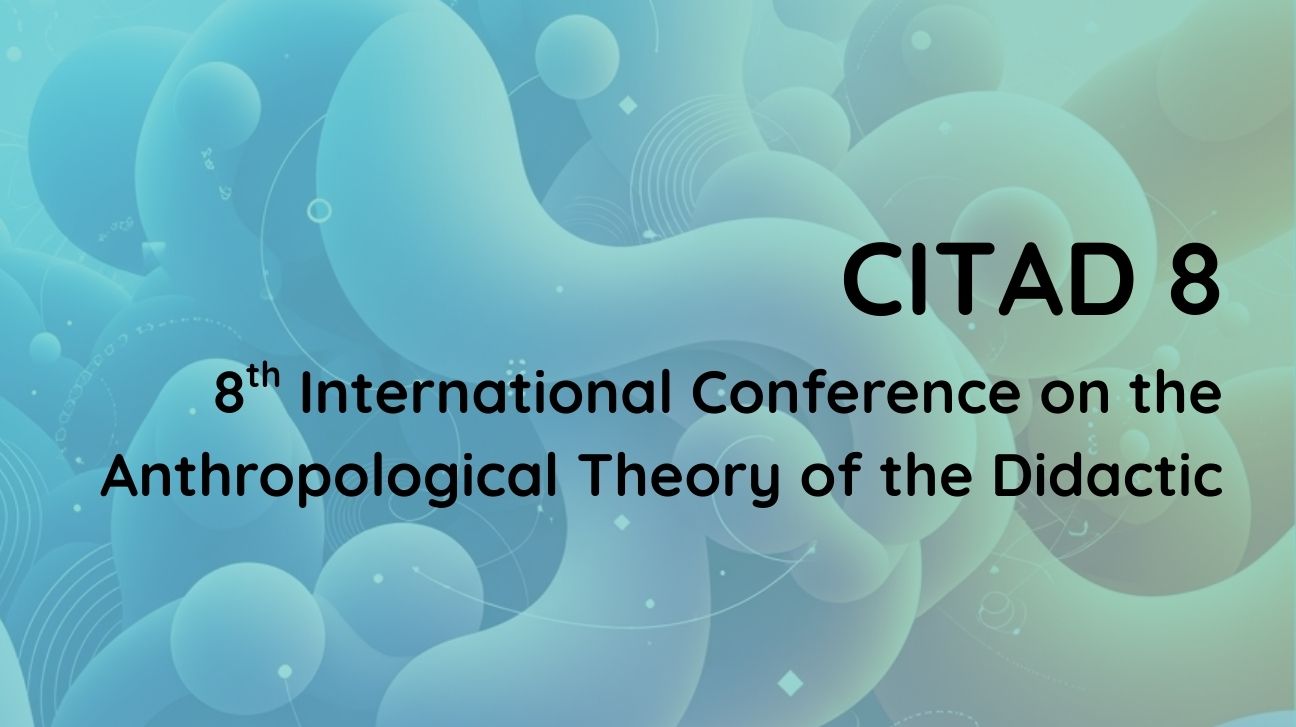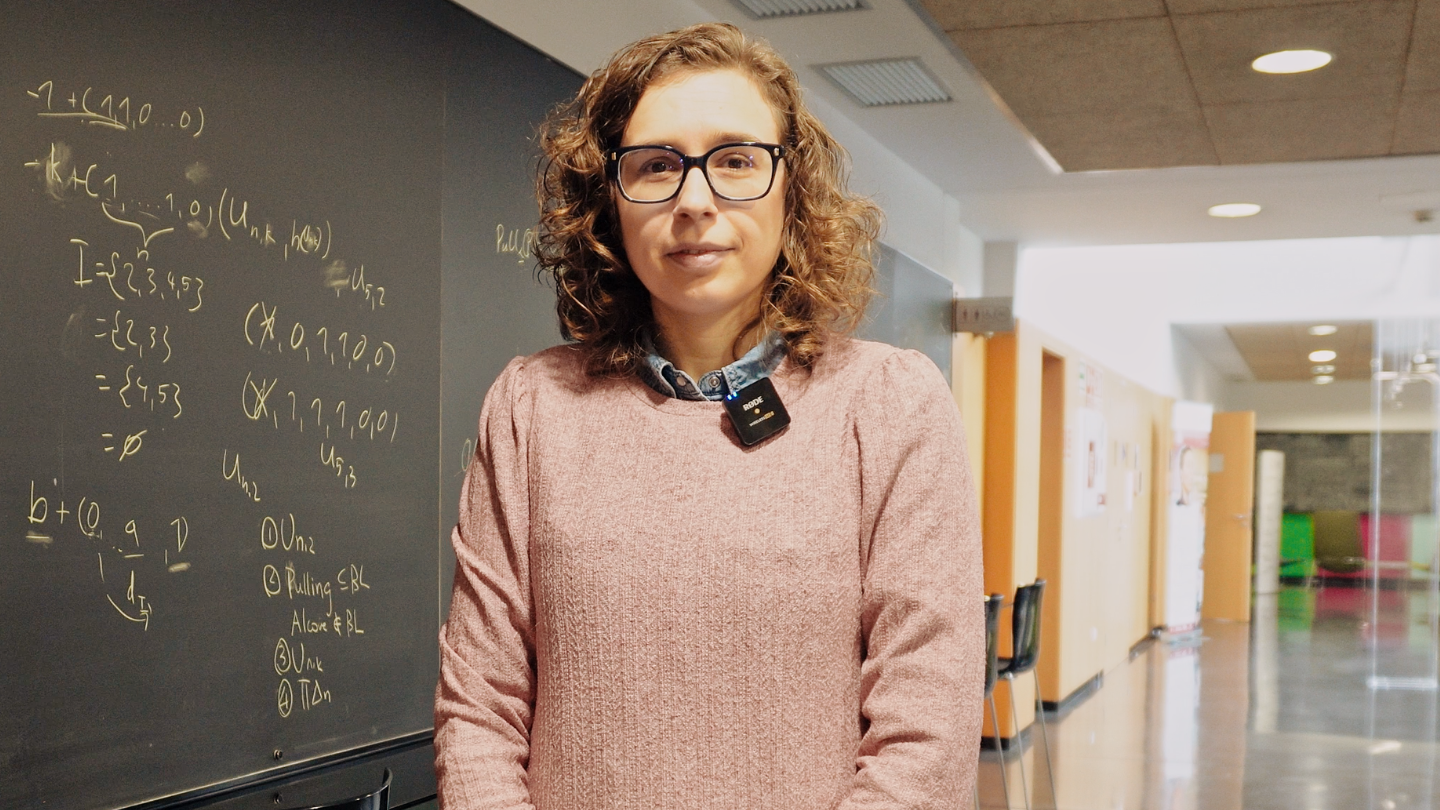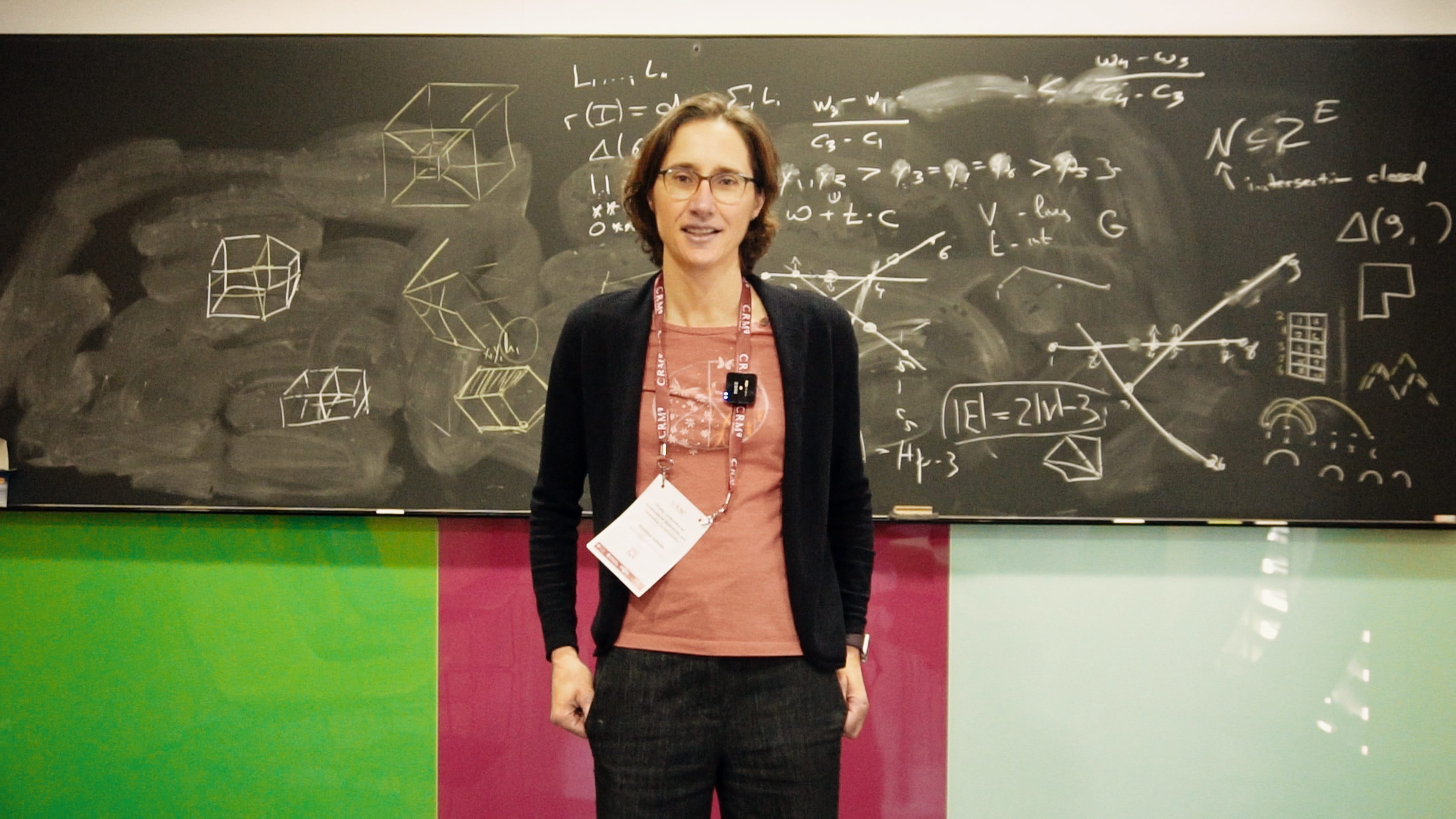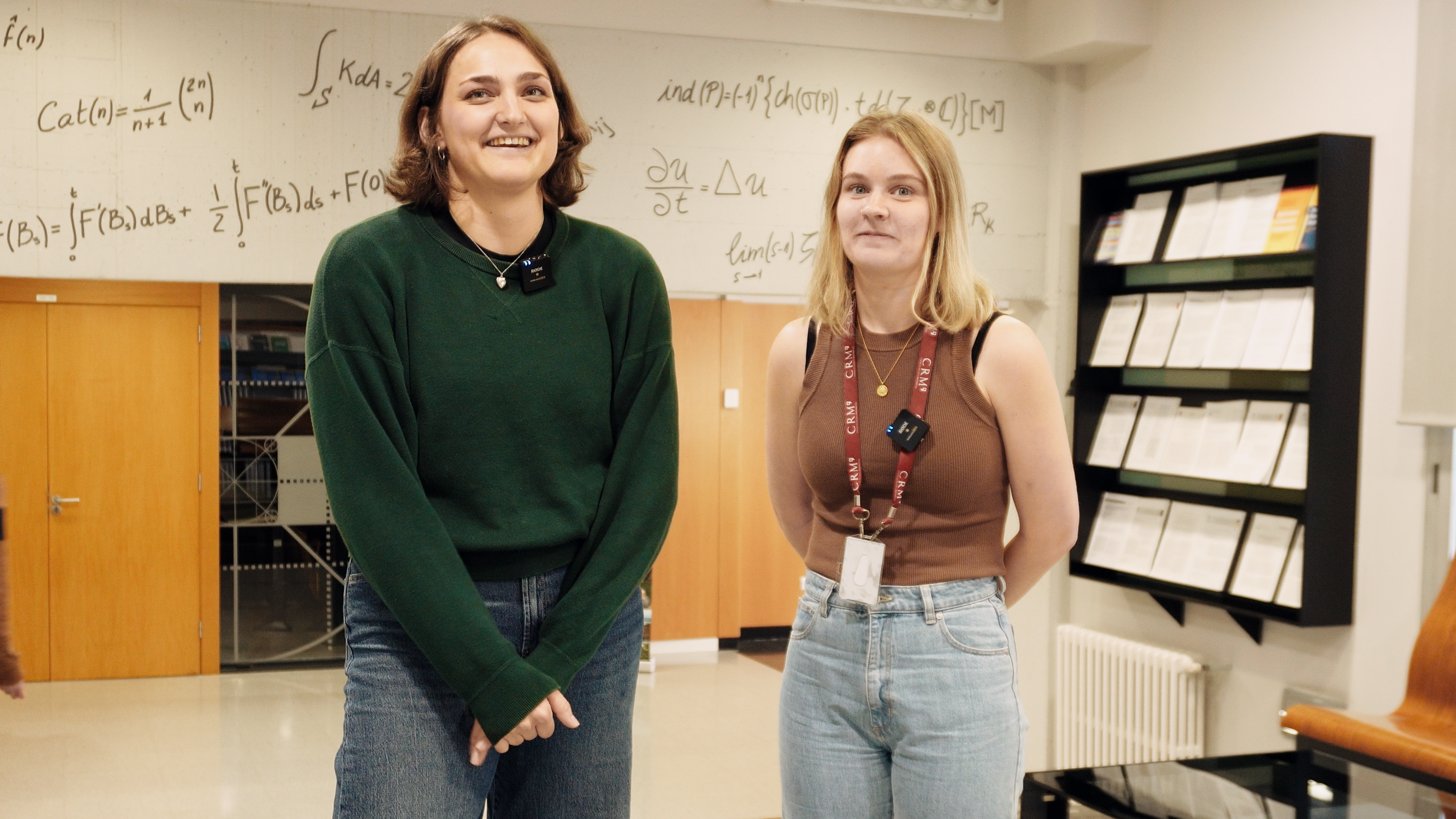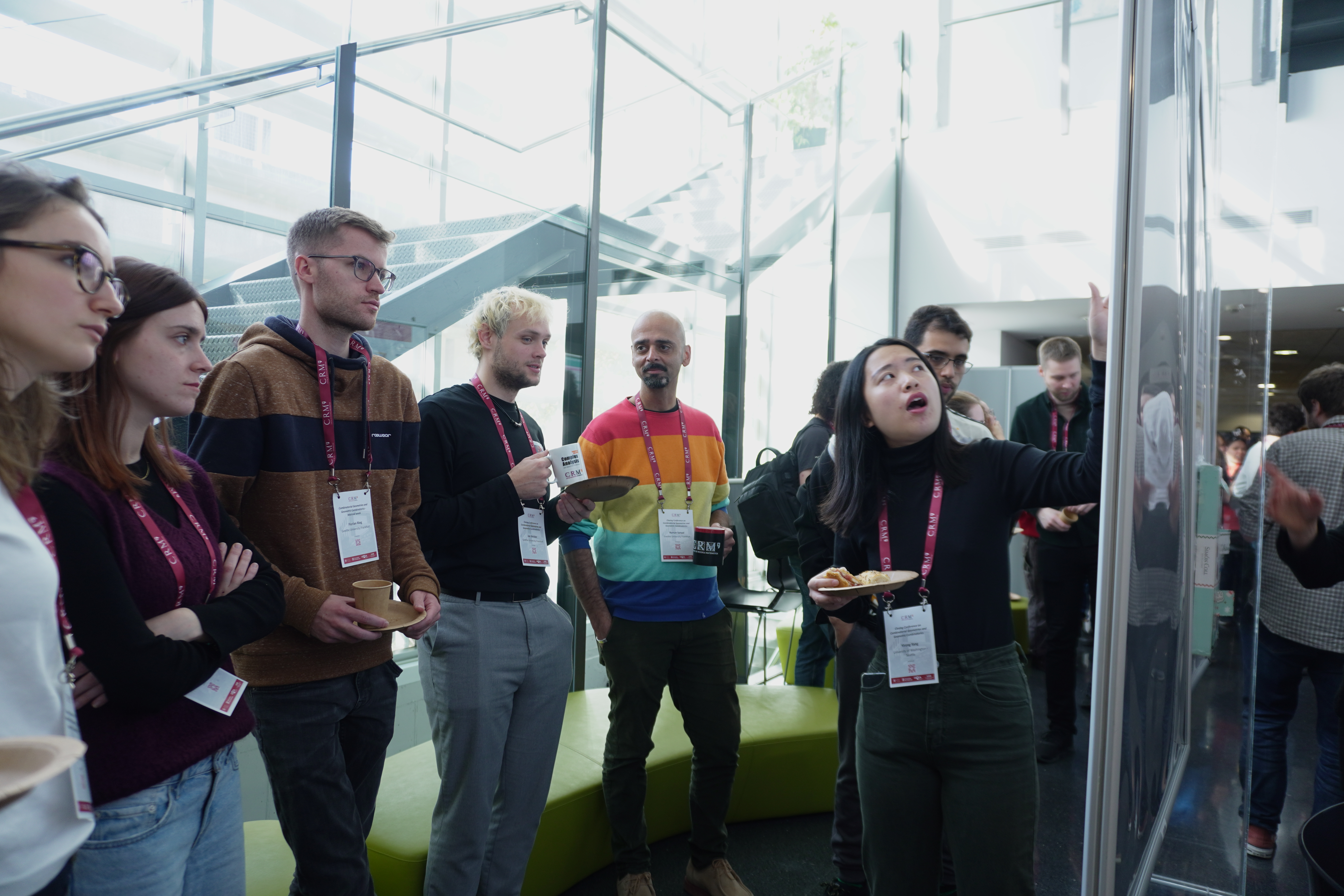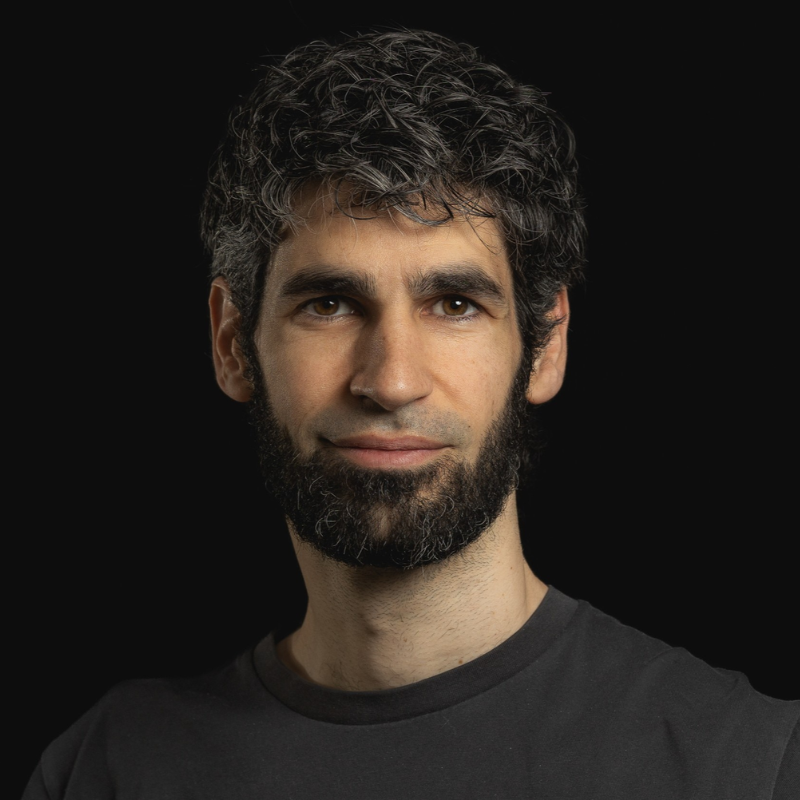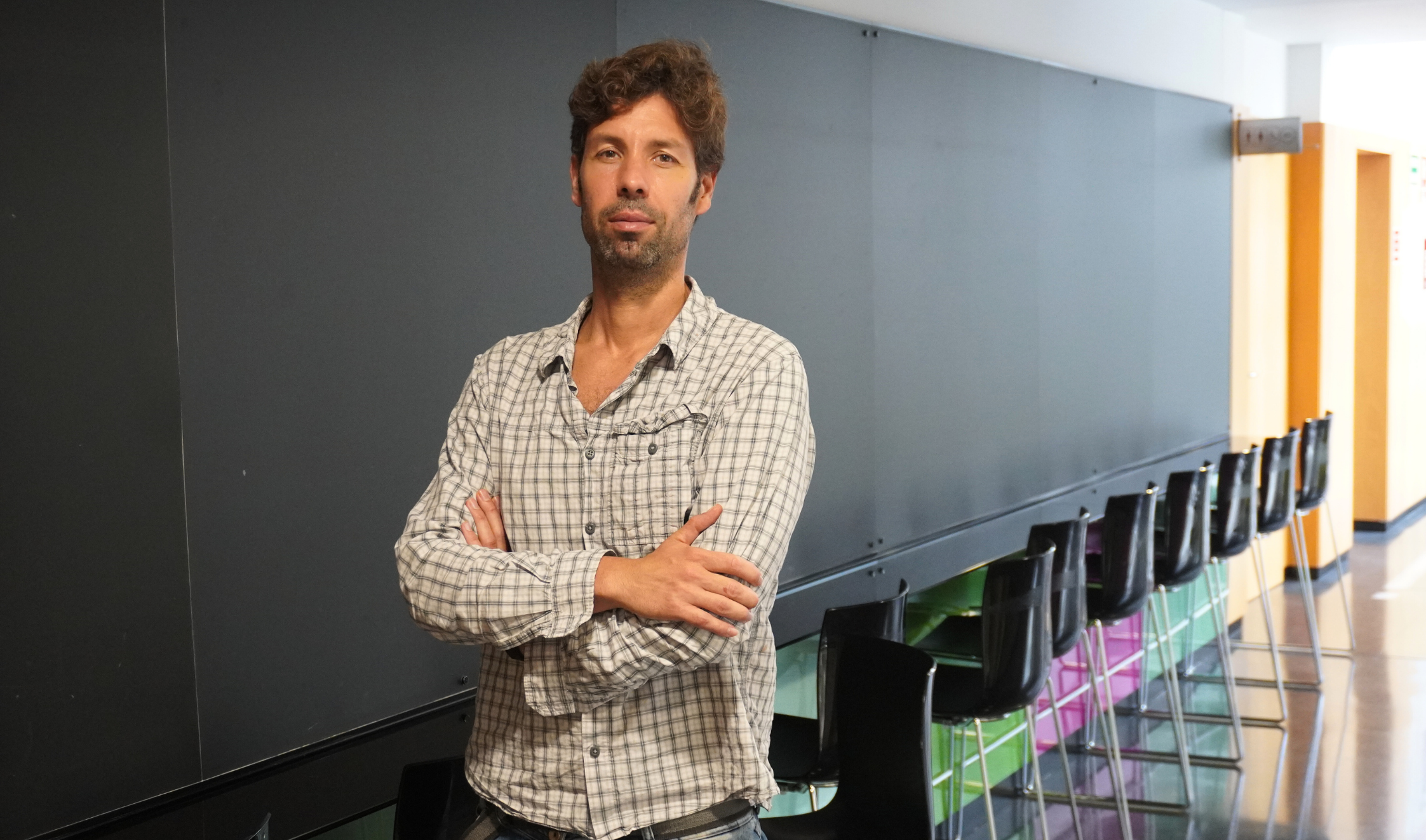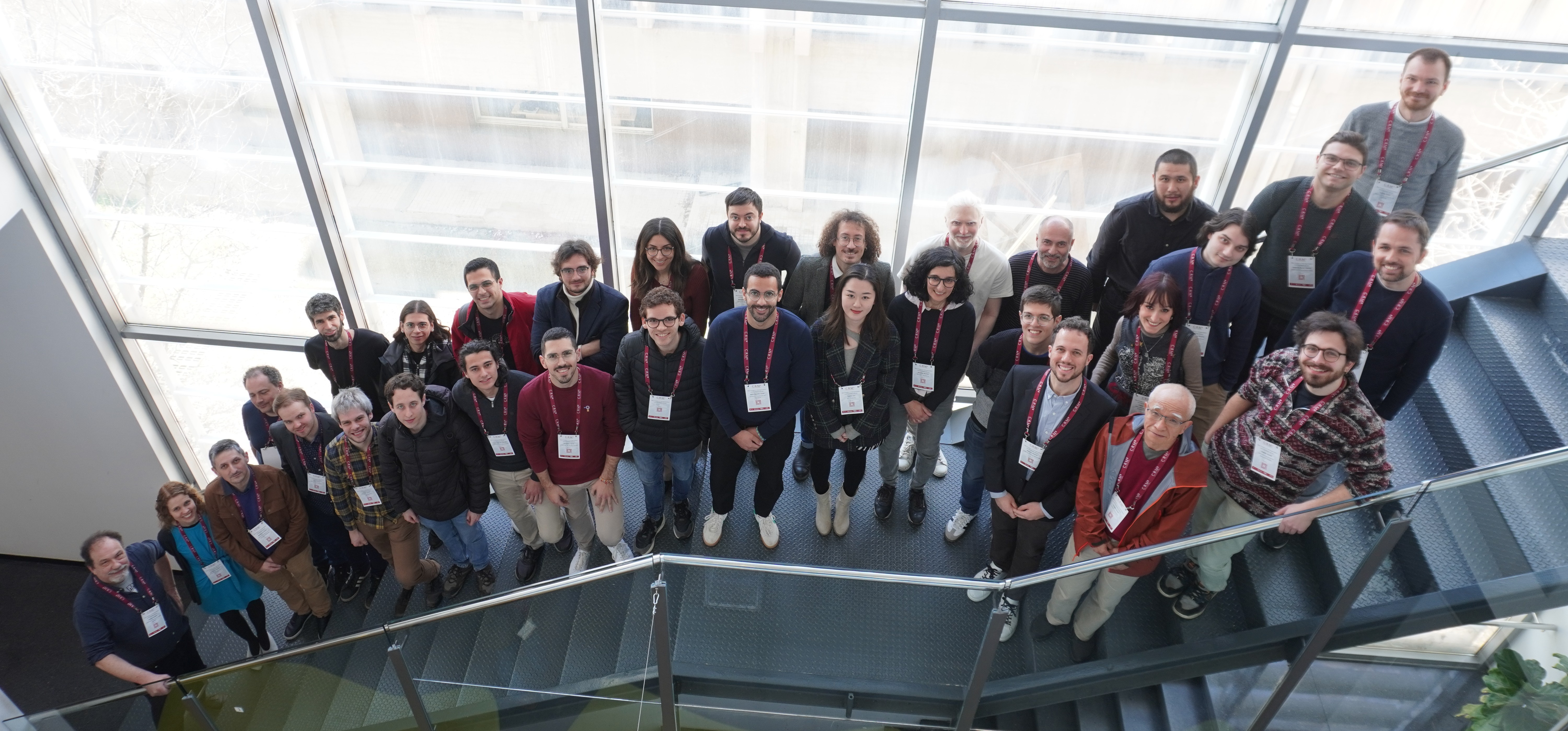
On 24-25 March 2025, the Centre de Recerca Matemàtica (CRM) hosted the ‘School on New Frontiers in Homogenization and Fractional Calculus’ to celebrate the 50th anniversary of Γ-convergence. This mathematical technique was introduced by Ennio De Giorgi and Tullio Franzoni in 1975.
Discover what Γ-convergence is here
Γ-convergence is a powerful technique in mathematical analysis, particularly in the calculus of variations. It is used to study the convergence of the shape of functions and functionals (which are mappings from a space of functions to real numbers).
This technique is crucial in applications in mechanics. For example, in the study of the behavior of heterogeneous materials, Γ-convergence helps to understand the macroscopic properties of materials from their microscopic structures. Similarly, it is a key tool for studying discrete-to-continuum transitions and optimization problems, providing stability under perturbations, as well as those involving variational principles such as image processing or fracture mechanics.
To illustrate, Γ-convergence is like a guide that ensures a chef, as they experiment with different recipes, will eventually create the ideal dish.
The event brought together leading experts in the fields of homogenization and fractional calculus to discuss the latest developments and applications of these mathematical techniques. Topics included phase transitions and asymptotic analysis of partial differential equations, as well as nonlocal problems, which are becoming increasingly relevant in materials science.
It also featured a series of lectures and discussions that highlighted the current state of research and provided valuable insights into the future direction of these fascinating areas of mathematics.
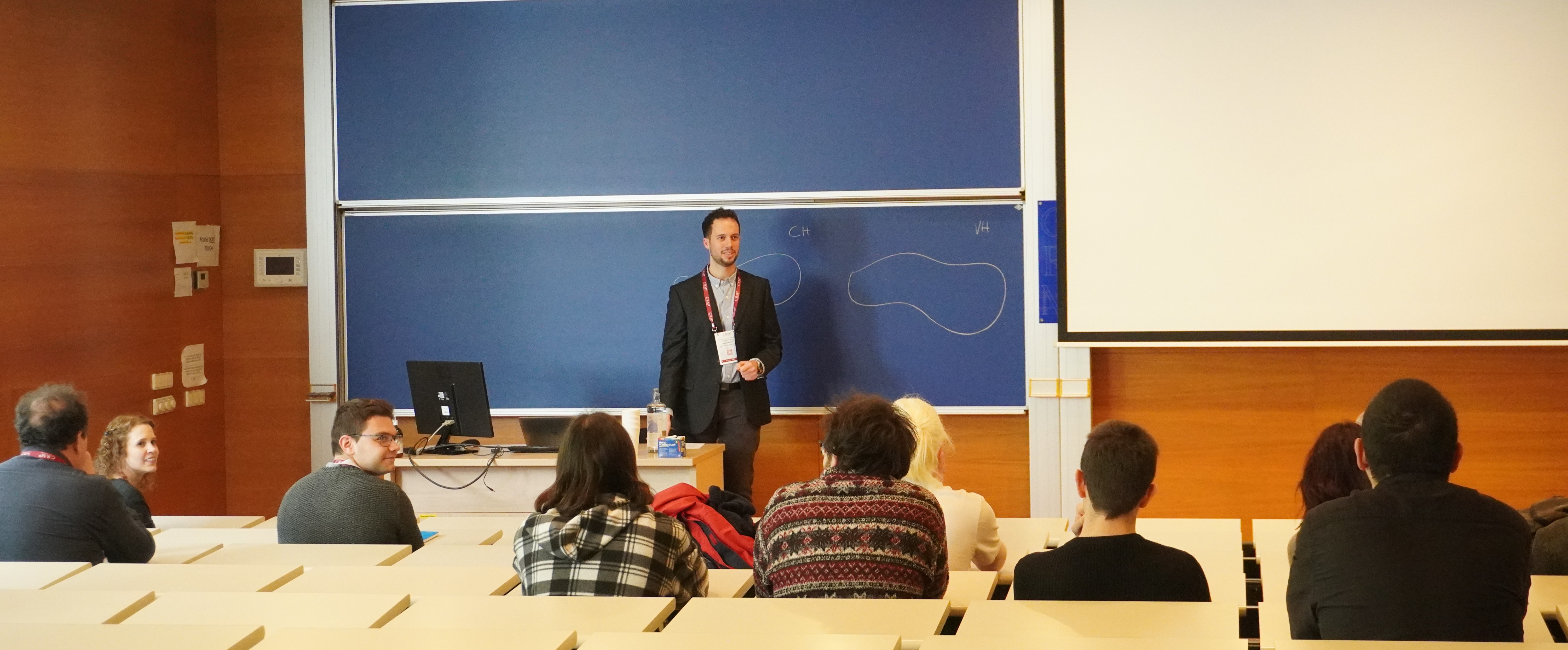
Alberto Maione during his presentation to the course.
In particular, the speakers were:
Andrea Braides, Full Professor at the University of Rome “Tor Vergata”. His research focuses on the calculus of variations, Γ-convergence, and homogenization. During the event, Braides gave a detailed overview about recent results on singular perturbations with fractional and higher-order seminorms, in the framework of phase transitions and of free-discontinuity problems.
Maicol Caponi, fixed-term Researcher at the University of L’Aquila. His research focuses on the calculus of variations, partial differential equations, and fracture dynamics, with applications in material science. In his talk, he spoke about recent results with collaborators, where the authors derived a strain-gradient theory for plasticity as the Γ-limit of discrete dislocation fractional energies, without the introduction of a core-radius.
Alessandro Carbotti, a Postdoc at the University of Salento, whose research focuses on fractional analysis, sub-Riemannian geometry and partial differential equations. Carbotti presented a new approach to the H-convergence problem involving nonlocal linear operators in fractional divergence form. If symmetry is also assumed, he showed that the H-compactness of the operators is equivalent to the Γ-convergence of the associated energies.
Patrick Dondl, Full Professor at the University of Freiburg (Germany), whose research focuses on numerical methods for partial differential equations and applications in mechanics. In his talk, he presented a numerical method for approximating the fractional Laplacian, approximating the operator using a basis formed by dilated and shifted tensor products of sinc functions.
Alex Ferrer, Associate Researcher at CIMNE and “Serra-Hunter” Associate Professor at Universitat Politècnica de Catalunya. His research focuses on structural optimization and additive manufacturing. In his talk, he presented the dehomogenization method for stress minimization in lattice structures, highlighting its efficiency compared to multi-scale topology optimization. Ferrer explained the use of homogenization to optimize macroscopic structures and addressed singularities in the orientation field, validating the methodology with numerical examples.
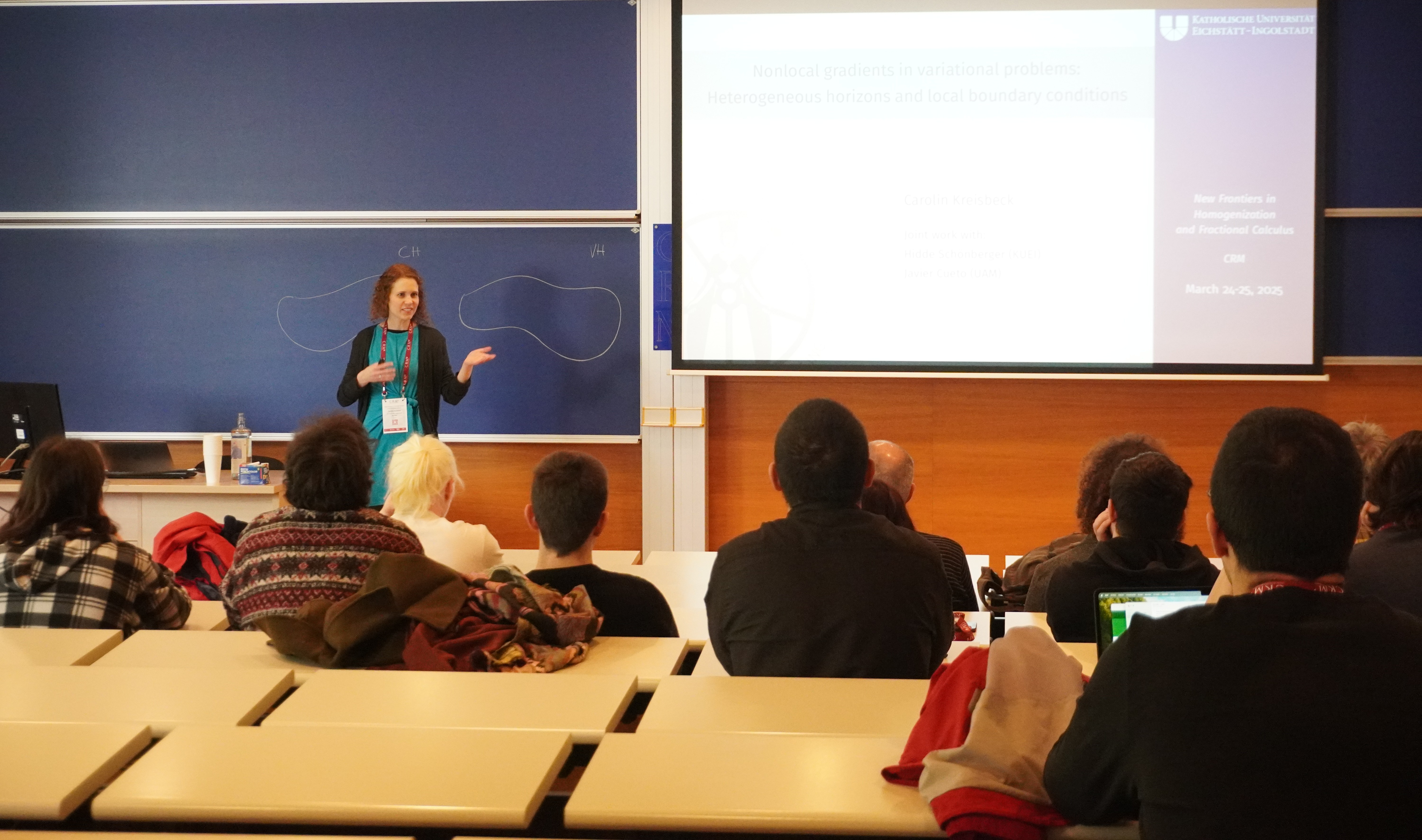
Carolin Kreisbeck during her talk.
Carolin Kreisbeck, Full Professor at the Catholic University of Eichstätt-Ingolstadt, whose research focuses on the calculus of variations and nonlinear partial differential equations, with applications in material science. Kreisbeck explored variational problems with integral functionals involving nonlocal gradients, focusing on Sobolev spaces, trace operators, and Poincaré inequalities. She established existence of minimizers for functionals with quasiconvex or polyconvex Lagrangians, depending on heterogeneous nonlocal gradients.
Fabio Paronetto, Associate Professor at the University of Padua. His research focuses on the asymptotic behavior of solutions of elliptic and parabolic partial differential equations. He talked about the existence and uniqueness of solutions of forward-backward parabolic equations, extending classical results and providing a G-compactness result for sequences of such operators.
Xavier Ros-Oton, ICREA Research Professor and Full Professor at the University of Barcelona, is known for the study of regularity theory for partial differential equations, integro-differential operators, and free boundary problems. Ros-Oton presented recent results on the regularity of solutions of the Boltzmann equation, a fundamental equation in statistical mechanics, which models the evolution of gas. He extended previous results by Imbert and Silvestre, demonstrating that if certain observables, such as mass and pressure, remain bounded, then the solutions are smooth.
Simone Verzellesi, a Postdoc at the University of Padua, whose research focuses on the calculus of variations and sub-Riemannian geometry. In his talk, he presented recent results for sequences of anisotropic integral functionals depending on Lipschitz continuous vector fields. He discussed about the properties of the anisotropic functional setting, and showed integral representation results for these functionals, as well as Γ-compactness results for sequences of anisotropic integral functionals.
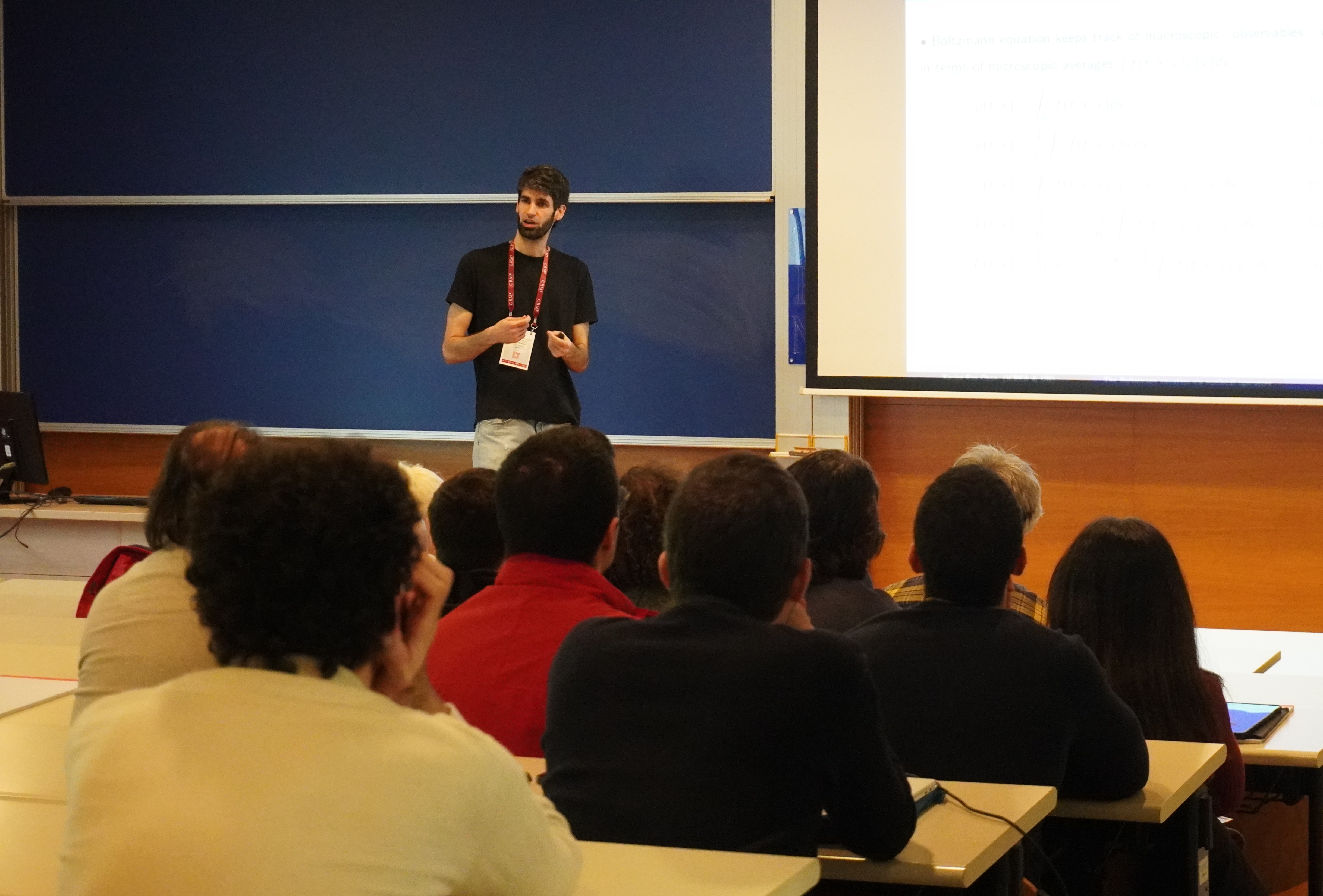
Xavier Ros-Oton during his talk.
This event was organised during the Research in Groups programme “A Mathematical Approach to the Homogenization of Nonlocal Composite Materials: H-convergence, G-convergence, and Γ-convergence” that took place at CRM for three weeks in March 2025. This initiative aims to foster deep collaboration between international researchers who share similar expertise and interests. It is a dynamic partnership in which researchers come together to tackle complex problems, explore new ideas, come up with innovative solutions, and push the boundaries of their respective fields.
In essence, the “Research in Groups” programme is a creative partnership for researchers to achieve more than they could do separately, pushing the frontiers of knowledge and innovation.
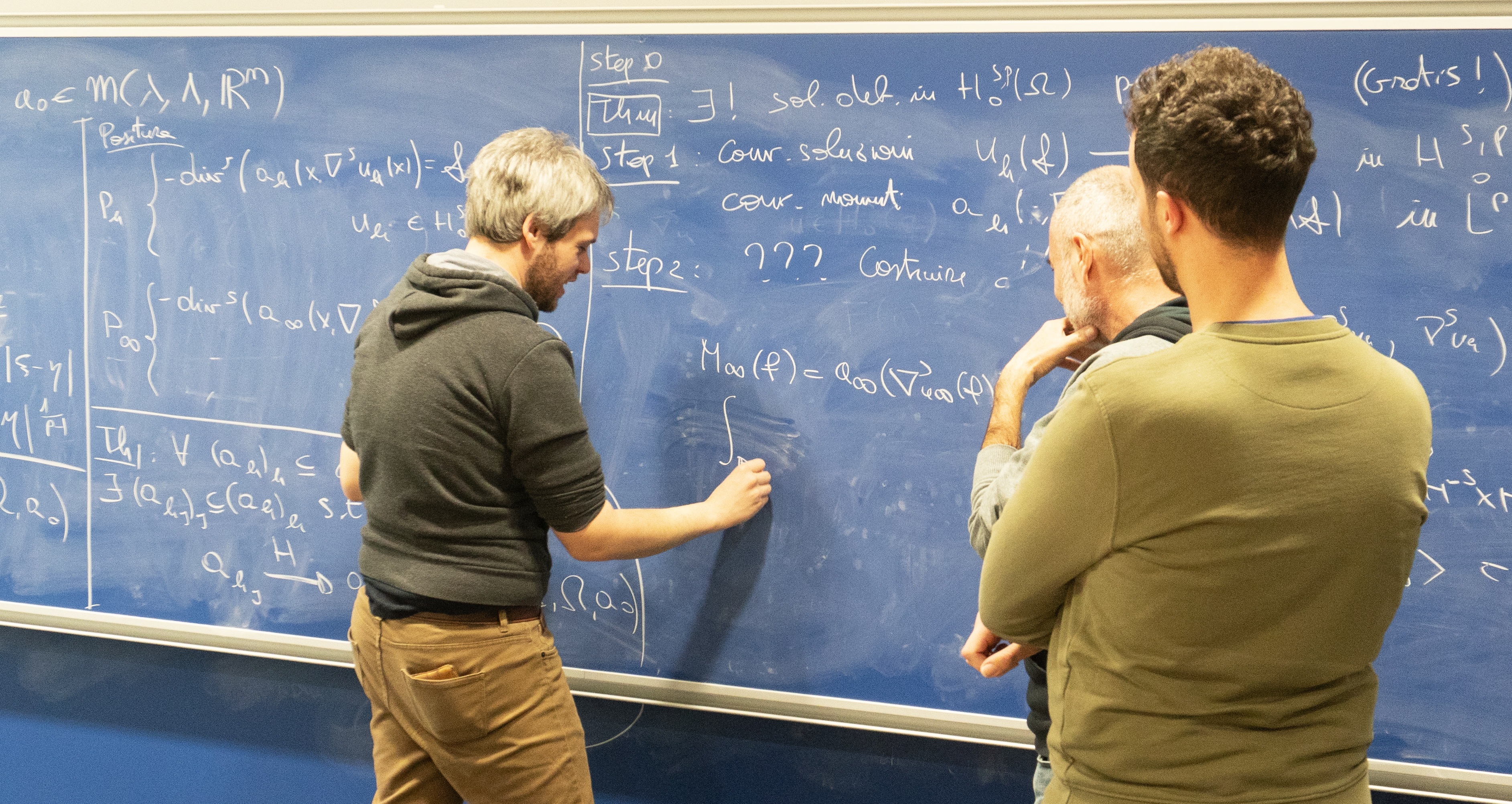
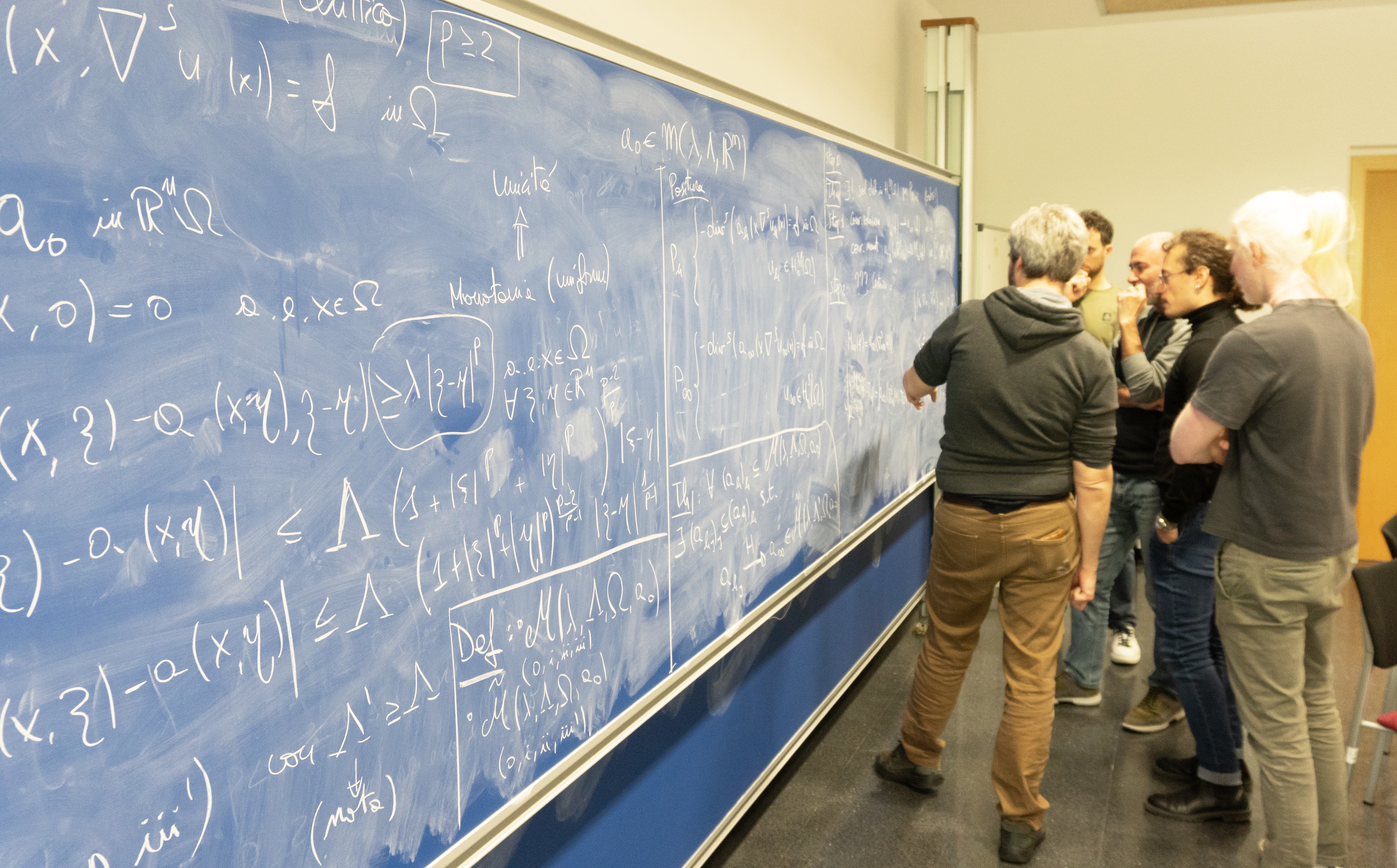
Researchers from the Research in Pairs programme solving problems together.
Overall, the School on New Frontiers in Homogenization and Fractional Calculus was a success, fostering collaboration and innovation to advance the understanding of these mathematical techniques.
Subscribe for more CRM News
|
|
CRM CommNatalia Vallina
|
Criteris de priorització de les sol·licituds dels ajuts Joan Oró per a la contractació de personal investigador predoctoral en formació (FI) 2026
A continuació podeu consultar la publicació dels criteris de priorització de les sol·licituds dels ajuts Joan Oró per a la contractació de personal investigador predoctoral en formació (FI 2026), dirigits a les universitats públiques i privades del...
Mathematics and Machine Learning: Barcelona Workshop Brings Disciplines Together
Over 100 researchers gathered at the Centre de Recerca Matemàtica to explore the mathematical foundations needed to understand modern artificial intelligence. The three-day workshop brought together mathematicians working on PDEs, probability, dynamical systems, and...
Barcelona + didactics + CRM = CITAD 8
From 19 to 23 January 2026, the CRM hosted the 8th International Conference on the Anthropological Theory of the Didactic (CITAD 8), a leading international event in the field of didactics research that brought together researchers from different countries in...
Seeing Through Walls: María Ángeles García Ferrero at CRM
From October to November 2025, María Ángeles García Ferrero held the CRM Chair of Excellence, collaborating with Joaquim Ortega-Cerdà on concentration inequalities and teaching a BGSMath course on the topic. Her main research focuses on the Calderón problem,...
Fuel Cells, Filtration, and Decades of Collaboration: A Conversation with Brian Wetton
Brian Wetton, from the University of British Columbia, spent last October at CRM collaborating with Tim Myers on computational models for filtration systems. His career has evolved from pure numerical analysis to applied mathematics with industrial partners, working...
From Barcelona to West Bengal: Chemistry Meets Mathematics to Enhance Water Filter Design
Researchers at the Centre de Recerca Matemàtica, in collaboration with IIT Kharagpur and UPC, have developed a mathematical model that accurately predicts the performance of fluoride-removal water filters made of mineral-rich carbon (MRC) and...
Polytopes, Matroids, and the Friends You Make: Martina Juhnke on Two Months at the CRM
The Centre de Recerca Matemàtica recently hosted a research programme on Combinatorial Geometries and Geometric Combinatorics, focusing on the overlap between polytopes and matroids. Martina Juhnke, a member of the scientific committee, reflects on how this programme...
BAMB! 2025: Participants Return to the CRM for Research Stays
In October 2025, the Centre de Recerca Matemàtica hosted Josefine Meyer (ISTA) and Cate MacColl (University of Queensland) for a month-long research stay following their participation in the BAMB! Summer School. Despite studying vastly different subjects, from...
Connecting Shapes, Patterns, and Ideas: the Closing Conference on Combinatorial Geometries and Geometric Combinatorics
During five days, the CRM hosted the Closing Conference of the MDM Focused Research Programme on Combinatorial Geometries & Geometric Combinatorics. The event featured plenary talks, contributed sessions, and posters on topics from matroids and polytopes to...
Xavier Ros-Oton among the 65 most cited mathematicians in the world
ICREA professor at the Universitat de Barcelona and CRM affiliated researcher Xavier Ros-Oton appears on Clarivate's Highly Cited Researchers 2025 list, which this year reinstates the mathematics category after two years of exclusion.Citations are a strange way to...
New Horizons for H- and Γ-convergence: From Local to Nonlocal (and viceversa)
The researchers Maicol Caponi, Alessandro Carbotti, and Alberto Maione extended the H- and Γ-convergence theories to the setting of nonlocal linear operators and their corresponding energies. The authors were able to overcome the limitations of classical localization...
Diego Vidaurre joins the CRM through the ATRAE talent programme
Diego Vidaurre has joined the Centre de Recerca Matemàtica through the ATRAE programme, bringing his expertise in modelling spontaneous brain activity across multiple data modalities. His work focuses on understanding how the brain’s intrinsic dynamics shape...

